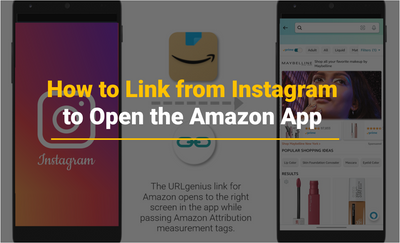It’s no secret that Amazon is King of the e-commerce castle, and as such, it makes perfect sense that some of today's biggest brands (and every type of e-commerce business in between) have flocked to the platform to establish a storefront.
If you're just getting started, as with any new online endeavor, it can be hard to get the ball rolling as far as conversion rates go. Sure, you’ve got the first step down— your brand and products are officially listed on Amazon. But what now? How do you reel customers in?
Well, there are a few important things you can do to knock it out of the revenue-park, so to speak. The first, of course, is to become an expert on the Amazon platform itself, which is no easy task due to the fact that Amazon offers a lot of tools to help you gain visibility and sales.
There are, however, three more important strategies that can position your brand toward success; and set you apart from your competition when it comes to Amazon marketing, full-funnel optimization, product rankings and of course revenue:
- Join the Amazon Attribution measurement program so you can run 'non-Amazon' campaigns and attribute results back to each campaign link and channel.
- Advertise on social media— Facebook, Instagram, TikTok, and YouTube— because that's where consumers are spending their time.
- Make sure you're linking 'app-to-app,' or in other words, from social media apps directly to the Amazon app— i.e. not sending traffic back to the Amazon website login.
Off-site marketing will certainly increase your Amazon sales but that's not all! When you open the Amazon app from Facebook ads, or link to the Amazon app from Instagram or simply open the Amazon app from TikTok profiles you will realize even more lasting benefits from these strategies.
The increased sales velocity from social media directly to the Amazon app will improve your product rankings in the eyes of the Amazon algorithm. Plus, more sales means more customers will review your products— and with every positive review and overall sales experience, the higher your brand will rank among your competitors as shoppers search for the types of products that you sell.
It's a self-reinforcing $$$ cycle!
Before we get too ahead of ourselves here, let’s go over some key things to know about Amazon Attribution measurement and how using it can help your grow sales while spotting trends.
Maximize Your Amazon Marketing Strategy With Amazon Attribution
Amazon Attribution is a measurement system for advertising and analytics that provides Amazon marketers with insight into how their non-Amazon marketing channels are performing. Non-Amazon channels include social media advertising, email campaigns, QR codes, events, and more. These essentially include any marketing activity away from the Amazon site itself.
While on-site Amazon Advertising tactics drive consideration and sales for your brands and products, non-Amazon channels also play important roles in the shopping journey. In fact, you may discover some audience shopping behaviors that you weren't aware of previously. For example, to what degree can social media (paid and/or organic) drive sales on Amazon when compared to other marketing channels?
You can't figure that out without measuring all of your non-Amazon campaigns.
Amazon Attribution measurement helps you gain visibility into which non-Amazon channels are helping customers discover and consider your store and products. Once you obtain some insights, you can optimize and plan your Amazon digital strategy based on what you learn. Then you can confidently invest more in the channels that resonate with your customers in ways that deliver customer engagement and sales.
In-app Amazon Attribution will also help you develop a marketing style for your company. For example, if you discover that Instagram or TikTok advertising is the best channel for finding new customers, you can design and optimize content and ads that work best for those social networks in a style and voice that is aligned with your brand.

Include Amazon attribution tags on all external marketing and advertising campaigns that lead visitors to your store or specific products. You'll be able to track customer behavior as a result as the Amazon Attribution system measures the following metrics:
- Impressions
- Click-through rate
- Detail page views
- “Add to Carts”
- Number of purchases
- Total revenue
As you see the results, you'll learn how fast you can find new customers by running ads and campaigns outside of Amazon compared to on-site advertising or waiting for customers to find your products on their own when they do an on-site search. Even if— at present— your search rankings are substantial and your conversion rates are high, it is still recommended that you run external, non-Amazon advertising campaigns so that you can maintain and widen the reach of your success.
In addition, you can determine which of your off-Amazon marketing activities yields the highest ROI. You'll quickly be able to observe which non-Amazon channels are bringing in the most money, and which are wasting your money.
Amazon has over 300 million customers, and sellers big and small are fighting for attention and sales. Finding audience trends (away from Amazon) that drive existing and potential shoppers directly into your store and to your products (by opening the app to the right screen) will increase sales, fill your remarketing funnel, and ultimately increase organic, on-site product rankings.
Hitting the Walled Garden: What it Means for Your Amazon Marketing Strategy
Now that we've covered the importance of driving non-Amazon traffic to your Amazon store and products, we need to go over how to optimize your Amazon links so that they can be used within other useful apps (namely social media apps).
Why should you update your Amazon links? Well, there is a huge roadblock that will impede the success of your social media ad campaign for Amazon. No fault of the Amazon platform itself— it's actually that pesky little walled garden that every social media platform (from Facebook to Instagram, to Tiktok)— uses to keep you from leaving their app.
What’s the walled garden? We've all experienced it as consumers ourselves. The walled garden is a phenomenon that refers to an app confining the user within its 'walls,' preventing the link from opening directly to another app. In this case, the destination app is Amazon, but the obstacle can apply to any other app.
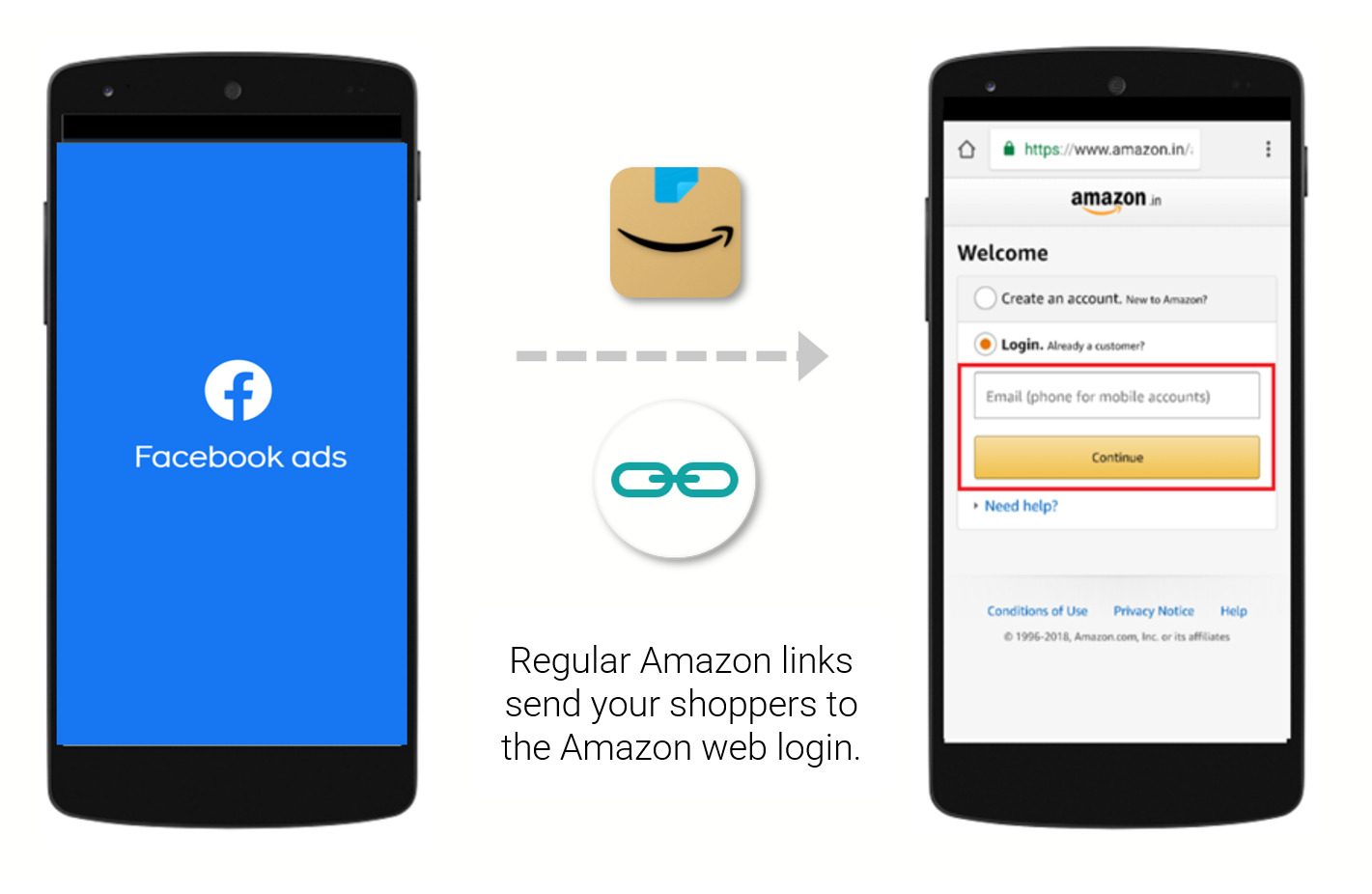
Okay, so what happens if the user can't leave the social app? It means that even if you have the Amazon app installed on your phone, it directs you to the Amazon web login in the social app's embedded browser. Annoying, right? The web login is like a brick wall that prevents customers from completing their shopping journey.
At that point, your product may as well be out of stock, or its link broken.
Although routing a shopper to the Amazon web login may seem like a minor inconvenience, this actually causes most shoppers to abandon their shopping journey, or find the product in another way. And guess what? Your campaign never gets the credit!
Not only do you lose a potential sale you could've gotten from that click, but you also lose any engagement signal that would have brought the shopper back into your sales funnel straight to the Amazon DSP for retargeting. As a result, this hurts sales velocity, which in turn makes your Amazon search rankings weaker than they should be.
Worry not, friend! URLgenius does indeed have a way to seamlessly link from social apps like Instagram, Facebook, or TikTok; and open the Amazon app on iOS or Android to the right store or product screen— all from the same campaign link! How? Via URLgenius app deep linking for Amazon, of course.
Your Amazon Digital Marketing Solution: URLgenius Links Open the Amazon App from Social Media and Other Apps
The URLgenius platform enables you, the Amazon seller, to update your Amazon links and give them that extra app linking capability that solves the walled garden problem. So what's the connection between URLgenius, the walled garden, and Amazon Attribution?
Remember, when a shopper is sent to a web login and doesn't proceed with the transaction, the Amazon Attribution tags are never passed. Cue the URLgenius platform: URLgenius deep links not only open the Amazon app to the right store or product screen, but they also pass your attribution tags into the Amazon app!
That's right, URLgenius supports in-app Amazon Attribution— in fact, URLgenius is the only verified Amazon Ads partner that can pass Amazon Attribution tags in-app from social media all without SDKs.
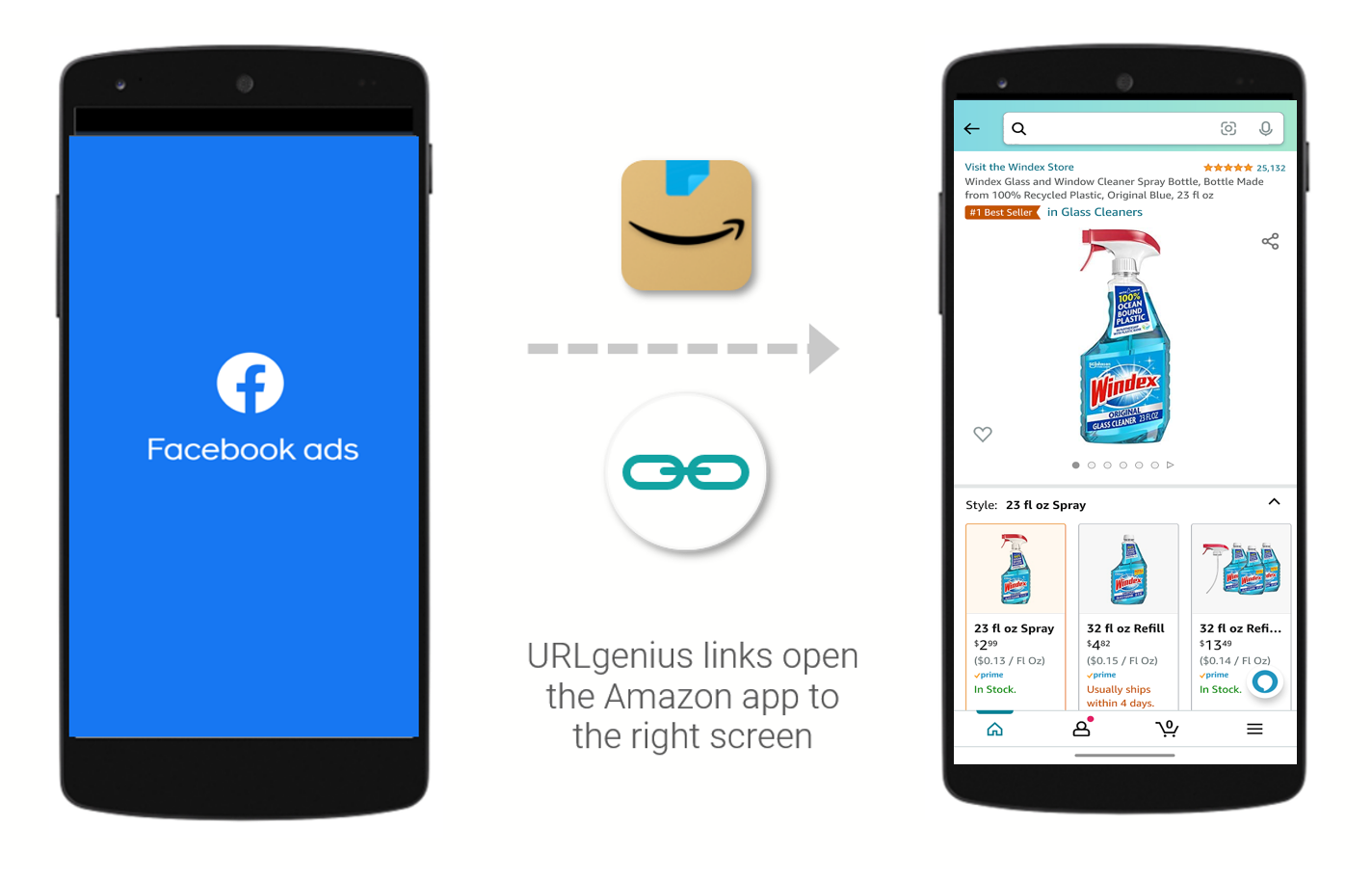
So when promoting Amazon links in non-Amazon marketing channels like social media, it’s important to 1) update your links with URLgenius and 2) include Amazon Attribution tags to ensure your campaigns get credit for the sale and the consumer engagement. And as we said earlier, if you haven’t done so yet, it's imperative that you join the Amazon Attribution program for Amazon sellers.
Last, but certainly not least, when your product sales are tracked through Amazon Attribution, Amazon is currently offering a 10% discount to be applied toward the fee charged on the sale. It's called the Amazon Brand Referral Bonus. Take advantage of this financial incentive while you can!
Step-by-Step: How to Link to the Amazon App from Social Media Apps Like Facebook, Instagram, and TikTok and Include Amazon Attribution Tags
At URLgenius, we've created a simple— yet simultaneously an enterprise-grade— process (it's even patented!) for updating your links, and you don't need any SDKs or technical resources, i.e. there's nothing to install!
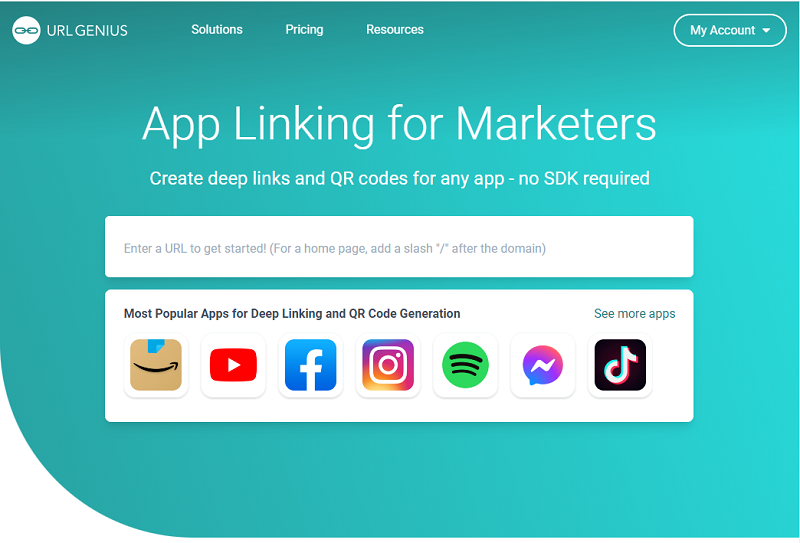
The first step is to go to the store, product, or page that you're promoting and copy the link from the address bar of your browser. This can only be a link to your store or to a specific product (at the moment Amazon Attribution is not supported on other types of links). You only need the basic links—you can remove any navigation tags that were added when searching for the correct Amazon link to ensure they don't interfere with tracking or activating the app.
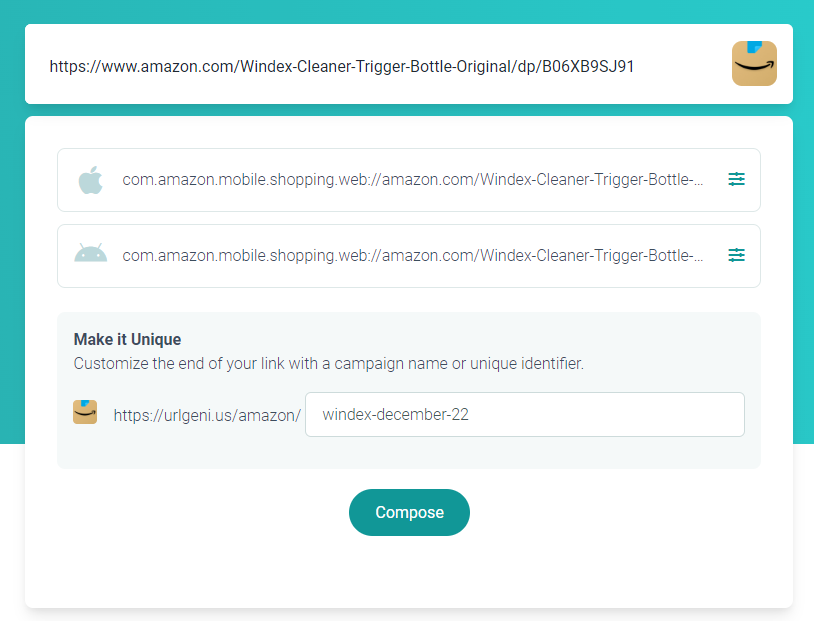
When you paste the link, observe how the Amazon logo is highlighted in the upper right corner—this indicates that URLgenius recognizes the sort of link you just pasted. Make sure to include your Amazon attribution tags on the link when you paste the link into the box on the URLgenius homepage.
To make it easier to find later, you can edit the end of the link to match your campaign. In this example, we named the end of the link 'windex-december-2022'. Then click 'Compose,' which takes you to the Amazon app deep link settings page, where you can copy and paste it into your social ad or any other channel. You can also scan the QR code or email it to test the link's behavior.
Amazon Attribution Pro tip: You can authenticate your Amazon account in your URLgenius account settings. URLgenius will then automatically append your tags when you turn on Amazon Attribution for that link from the settings. This feature is currently only supported for store pages and product detail pages. For other types of pages, include your Amazon measurement tags when you create your URLgenius link by building the link in the Amazon Ads console. Contact us if you have questions about this feature or would like a demo!

Branded Domain Pro Tip: Your app deep link will look like this example, but you can use your brand's domain for all your app deep links and QR codes. This helps you extend your brand name and establish credibility when deep linking from your website to different apps. An don't worry, Amazon Attribution is still supported when you brand your links!
URLgenius and Amazon Attribution Reporting
URLgenius presents you with its own insights into how many times the Amazon app has been opened and if your audience uses an iOS or Android device etc. To see your Amazon Attribution, you'll need to look in your Amazon Ads account.
If you connect your URLgenius account with your Amazon Ads account, you'll find the URLgenius referenced in the name of the campaign upon inspecting the reporting section of your account. Here's an example of how a URLgenius campaign looks in the Ad Group view.
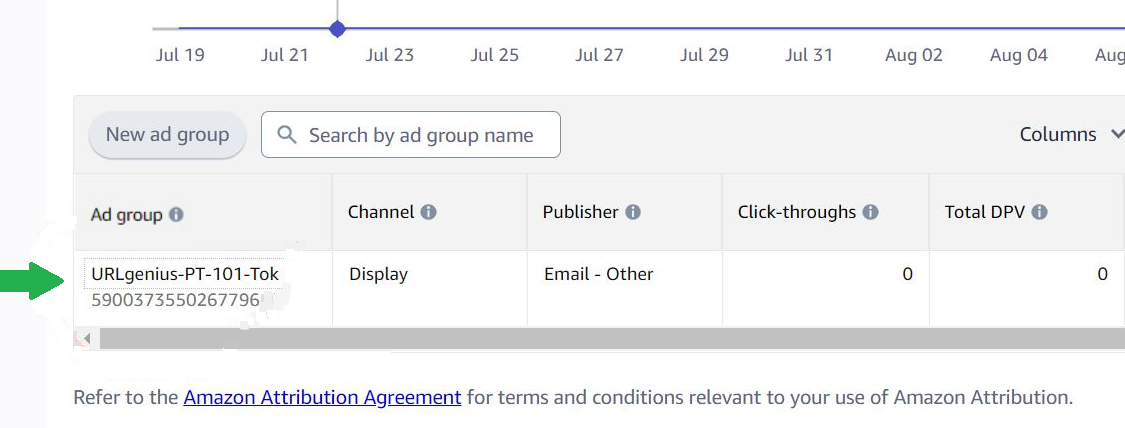
And here is how a URLgenius link looks in the campaign view. Make sure to link your URLgenius account with your Amazon Attribution account to optimize reporting.

QR Code Tip: Every URLgenius app deep link also has a corresponding QR code that you can download. URLgenius reporting will track scans and clicks separately from clicks. Create a branded app deep link and custom QR code to use online or offline to promote your Amazon store and product listings. Use in posters, packaging for re-order, tradeshows, and events.
Just click on 'QR Settings' in the settings for your URLgenius link to find and download your QR code.
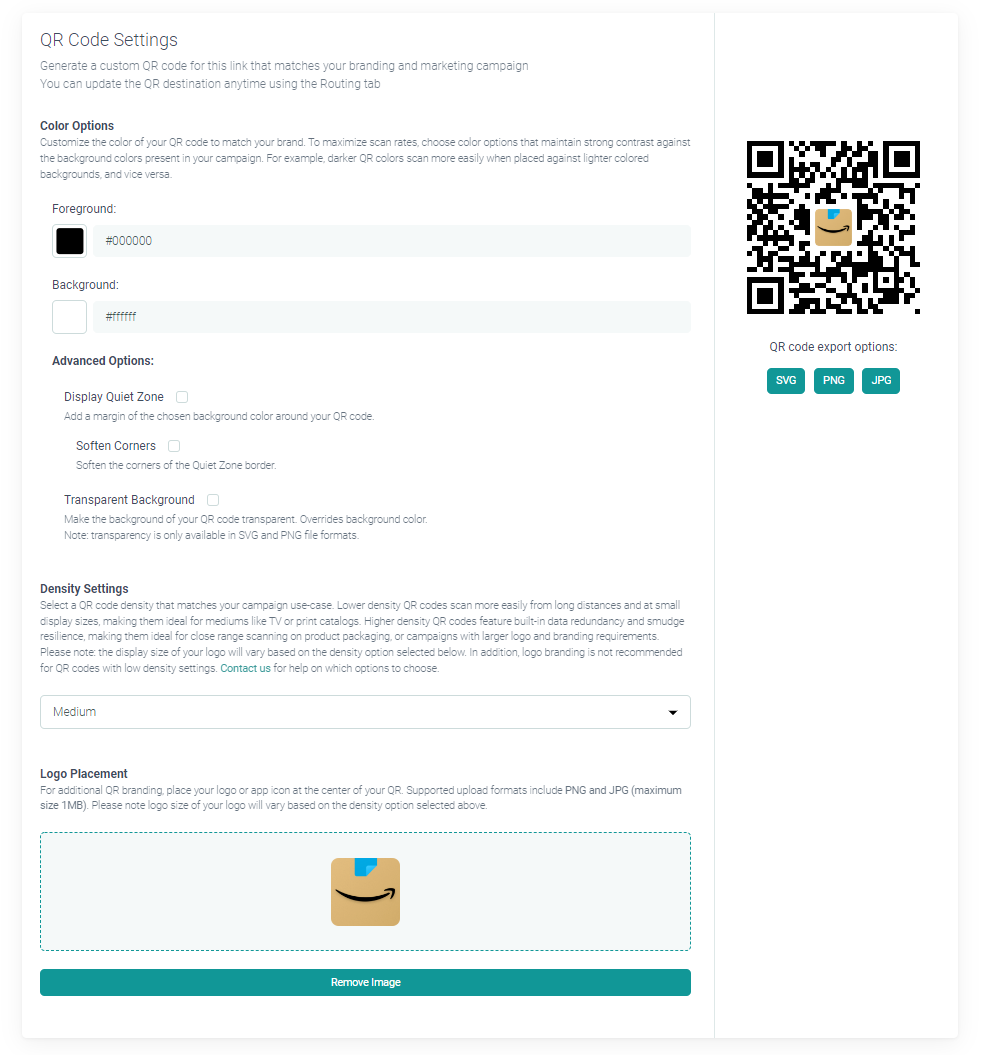
As an Amazon Seller, getting your audience back into the Amazon app from different non-Amazon marketing channels is the key to earning more sales, product engagement, and higher product rankings. No matter the channel, make sure to use a URLgenius link to open the Amazon app and maximize revenue!
We are here to help! Contact us with questions at [email protected] if you need help setting up your Amazon campaigns with Amazon Attribution measurement.




